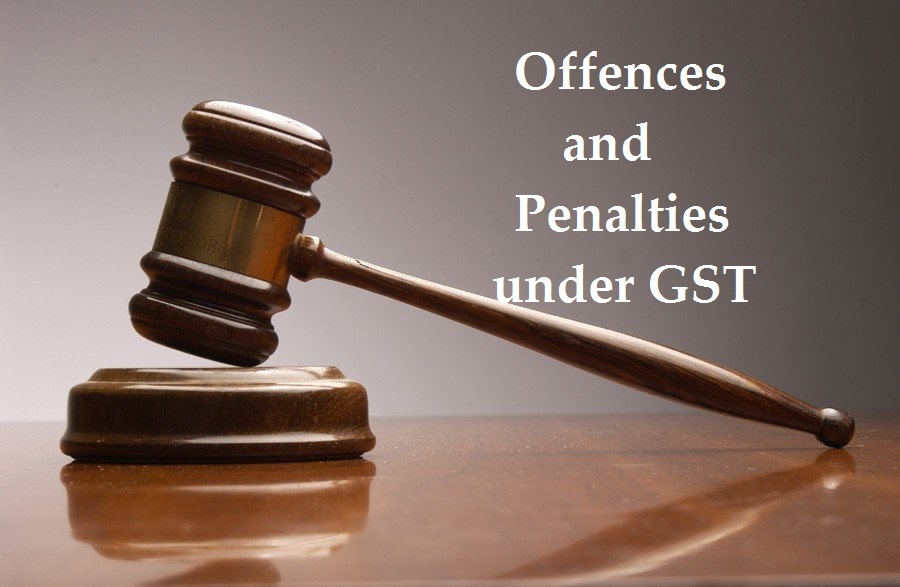Offence in general means a breach of Law or Act or any illegal act and penalty is defined as the punishment for committing an offence.Section 122 to 138 of the GST Act defines Offences and Penalties under GST.

Offences and Penalties under GST
The GST Act lists 21 offences in section 122 which are subject to a penalty of 10,000 rupees or the amount of tax involved, whichever is higher.
| Nature of Offence |
Where a taxable person who –
|
Penalties under GST
Penal provisions have been prescribed for all kinds of offences (under GST) in Model GST law. The law also mentions certain principles on which these penalties should be based.
For any person who:
- Aids or abets any of the 21 offences mentioned in Section 122(1)
- Acquires possession of or conceals himself in transporting, depositing, keeping, concealing, supplying or purchasing goods which are liable to confiscation.
- Receives or is in any way concerned with the supply of services which are in contravention of this act.
- Fails to appear before the officer.
- Fails to issue invoice or fails to account for the an invoice in his books of accounts.
Shall be liable to penalty which may extend upto 25,000 rupees.
Punishments as a Result of Prosecution
If fraud is ascertained, then apart from the above amounts, the following shall also apply:
| Amount of Tax Evaded | Punishment |
| 1. Between Rs.100 lakh and Rs.200 lakh | 1 year imprisonment + fine |
| 2. Between Rs.200 lakh and Rs.500 lakh | 3 years imprisonment + fine |
| 3. More than Rs. 500 lakh | 5 years imprisonment + fine |
The respective authority shall issue a Show Cause Notice to the taxable person and offer him a reasonable time for being heard. The authority shall have to justify the imposition of such penalty as well as the nature of the offense committed. Where a taxable person intentionally discloses an offense committed by him, it is within the powers of the respective authority to reduce the amount of penalty to be imposed.
Prosecution Under GST
Where a person commits the following offenses with a deliberate intention to cause fraud, becomes liable to prosecution under GST, i.e., face criminal charges..
- Claiming refund of CGST/SGST by fraud
- Submission of fake documents or returns
- Issuing any invoice without making a supply of goods or services
- Abetting in the fraud under GST
Appeals In GST
A person unhappy with any decision or order passed against him under GST can appeal against such decision. The first appeal against an order by an adjudicating authority goes to the First Appellate Authority.
If the taxpayer is not happy with the decision of the First Appellate Authority they can appeal to the National Appellate Tribunal, then to the High Court, and finally to the Supreme Court.
All appeals shall only be entertained provided the same is filed as per prescribed forms, and minimum fees are paid. The fee for an appeal shall be:
- 100% of the tax amount, interest, fee, penalty, arising from such challenged order AND
- 10% of the disputed amount.
The above amount of 10% can increase up to 25% of the disputed amount, where the disputed tax amount is above INR 25 Crores. On the other hand, where the Commissioner of GST or an officer is the appealing person, then no such prepayment of fees is required.
Inspection, Search/Seizure under GST
Where the Joint Commissioner CGST/SGST has sufficient reason to believe that a taxable person is deliberately suppressing transaction to evade taxes or has claimed excessive Input Tax Credit, then he can order an officer of GST to inspect the locations of such person.
Similarly, The Joint Commissioner of SGST/CGST can order for a search. He will order a search on the basis of results of inspection (or other reason) if he has reasons to believe –
- There are goods which might be confiscated
- Any documents or books or other things which are hidden somewhere. Such items can be useful during proceedings.
Such incriminating goods and documents can be seized.
General Principles for Imposing Penalties:
1) No penalty for minor breach:
Often a person can make mistakes which may appear as fraud or an attempt to evade tax. Sometimes, these mistakes are committed unknowingly or without any malicious intention. The reason could be poor understanding of tax laws or carelessness in following procedures.
Therefore, to save innocent persons from hassles of penalties or associated processes, the model GST law has laid down some guidelines.
- If the error in taxes is Rs. 5,000 or less, then the breach should be considered minor & no penalty should be imposed.
- If the mistake committed by the person is easily rectifiable, then the breach should be considered minor & no penalty should be imposed.
2) Penalty should align with severity of breach
Severity of breach of law should be established by analysing the facts & situations & penalty should be imposed accordingly.
3) Reason behind penalty should be disclosed
Model GST law asks the tax authorities to ensure that the person on whom penalty is to be imposed has been provided all the relevant information before being penalised. The concerned person should be informed why he is being penalised.
4) Lower penalty on voluntary disclosure of breach
Penal provisions of model GST law are lenient for those who voluntarily disclose the breach they committed. This will give encourage offenders to admit their wrongdoings without worrying about the repercussions. As per clause 68(5) of model GST law, a tax official may consider this action while establishing penalty. However, this provision will not be applicable in cases where the law prescribes a fixed amount or fired percentage of money as penalty as per clause 68(6) of model GST law.
Cognizance of Offences:
The law specifies that any court is not allowed to take cognizance of any offence without proper sanction from concerned authority. Any court which holds a lower position than a Magistrate of the First class cannot hold trial against an offence under GST.
Presumption of “Mens Rea” or Guilty Mind:
When prosecuting an offender, the court shall assume that the accused had a guilty mind or the law was broken with the intention to break it. The accused shall have the liberty to prove it otherwise.
Offences and penalties under GST is likely to be rational and transparent which will decrease the litigation as it is provided with Explanation wherever there is confusion.
If any queries or looking for any help on this, please visit us at Reach Accountant
Check GST Common portal for information CBEC











/0.png)
/1.png)
/2.png)
/3.png)
/4.png)
/5.png)
/6.png)
/7.png)